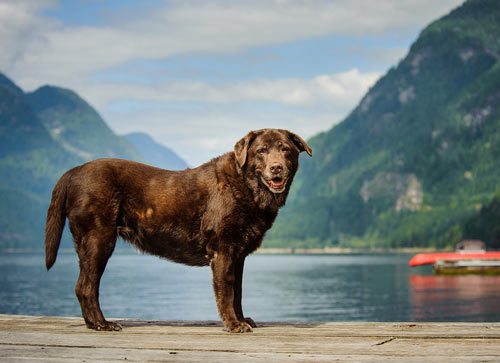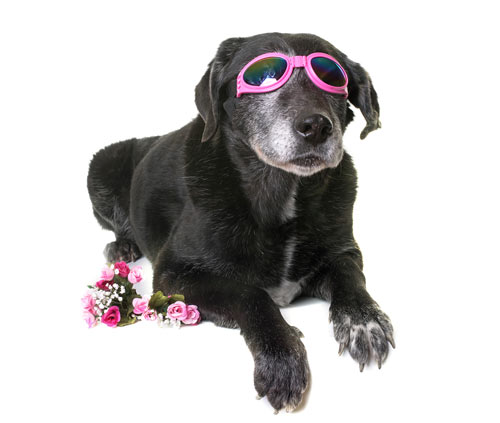Senior Dogs Living with Senior Citizens
From a pamphlet published by Pam Bishop, © 1994, All Rights Reserved. 31415 Hawthorn Street, Menifee Valley, CA 92584 (909) 672-2008.)
“Both the human and the dog need someone in their lives.”
Senior dogs in many ways are the same as their human counterparts. Many of the same ailments and general problems are faced by both man and dog. One devastating problem is losing the person closest to them. For the human senior, the loss of that lifetime mate is a tragic experience. The loss of a lifetime owner can be equally difficult for the canine senior. It’s hard to make the adjustment to living without a lifetime companion. Both the human and the dog need someone in their lives, and often the best decision is to put these two seniors together.

Puppies are darling and so much fun to watch at play, but they are also a lot of work. Much like grandchildren they are best when you can choose when to have them around and then when to send them home with their parents. And they can be dangerous around someone who does not move quickly any more. A senior can trip over a fast moving puppy and both can be seriously hurt. Housebreaking takes a lot of time and patience. Puppies are active and into everything and they can do a lot of damage to a well-cared-for home. Any puppy requires a lot of time and training. Their lives are moving at a different speed from a senior.
The senior dog is at the same place in his life that the human senior is in his. If given love and caring, they can make the change to a new home with few problems. Their needs are usually simple and they are happy with a quiet and uncomplicated life. Remember, they are often set in their ways and not interested in learning a lot of new things. That doesn’t mean they can’t learn, just that they can be more set in their ways. They also need a reason to get up in the morning and things to do to put the fun back in their world, but their lives also need to be kept simple.
Many senior dogs have been loving, well-behaved dogs all their lives and now, through no fault of their own, they are alone. They may still have several healthy years ahead of them and no one to share this time with. There are no guarantees on their health of longevity, but we can’t offer any guarantees either — just love, loyalty, companionship and a reason to live.
Many of us love our pets so deeply that we think that if we get an older dog it will die soon and we will just have to grieve again. While there is some truth in this, remember the old saying that “it is better to have loved and lost than to have never loved at all.” If you turn your back on the senior dog he may not get another chance. Imagine you just moved to a new area in your senior years and your neighbors said, “She’s just going to die in a few years, I don’t want to be friends with her.” What a terrible loss for both of you at a time in your lives when both have the most to give. Quality of time together and companionship can be wonderful for both the senior dog and the senior citizen. Give it a chance!
If you are thinking of taking in a senior dog, try to get as much information as possible about the dog and its prior owner. Always be sure to get a health check by a veterinarian. It gives you a baseline to work with and will let you know if the dog needs any special medication or care. Sometimes the news is better than you think. Old does not have to mean sick, weak or infirm. Many older dogs are very healthy well into their teens. Important things to check are eyes, ears and teeth. Most dogs over ten years of age do not see as well as they did when they were younger. If they were humans, they would need reading glasses. Your veterinarian can tell you if your dog is getting cataracts serious enough to strongly limit his vision. Dogs do quite well with very limited sight, but you must be aware of dangers that they cannot see.

Older dogs sometimes do not hear well either. If both hearing and sight are diminished, the senior dog cannot protect itself from many things that could be a danger to it. Being aware of this can help the senior dog stay safe.
Ear infections are more common in older dogs and this should be watched for so they can receive prompt treatment. Teeth are another important thing to watch — many older dogs have dirty teeth that need to be cleaned by the veterinarian. In some cases, bad teeth need to be pulled. Uncared-for teeth can lead to general infections in dogs that can affect their overall health.
Older dogs need to be kept warm in the winter and cool in the summer. They need to be loved by someone who understands the simple problems of life and realizes that your senior years can be some of your best.
If you are considering a canine senior, plan ahead before bringing the dog home. Look around our home and make it as dog-proof as possible. As most older dogs don’t see as well as they did when they were younger, it is important to remove anything that might be a danger. Take off your glasses and look around. That’s probably how it will look to your dog. Put water and food dishes where they will be easy to find. Until the dog is used to your home, barricade off the back part of your house. Even a dog that has always been well housebroken can have an accident. This happens most often with the older dog when they can’t find their way to the door. If they are confined to one or two rooms where you are, it is much easier to get them started out
correctly.
Be sure to continue with the same food that the dog has been eating. It would also be a good idea to put your dog on bottled water until it has settled in its new home. Any change in food or water can cause diarrhea. If possible, find out what hour your dog got up and when it went out for the last time at night. You want to make changes slowly. Like yourself, your senior dog has a set pattern to his life and can be upset if too much is changed all at once.
 When a couple of weeks have passed it will seem as though you have always been together. Both lives will be enriched. Remember that your dog is used to someone else’s life patterns and must adjust to yours as you must adjust to his. The work and patience you put into it will be well worth it.
When a couple of weeks have passed it will seem as though you have always been together. Both lives will be enriched. Remember that your dog is used to someone else’s life patterns and must adjust to yours as you must adjust to his. The work and patience you put into it will be well worth it.
Try to get any of your dog’s things from his old home. A dog bed or his dishes or toys. This will help make the transition easier. If it is wintertime, be sure to keep your dog dry and warm. If he is short-coated, have him sleep with a sweater. In the summer be sure to keep him cool and see that he has lots of fresh water. Senior dogs need to be kept indoors at night for both their comfort and protection. Be sure this is acceptable to you before getting your dog.
Older dogs still need regular grooming. Toenails must be kept short as well as ears cleaned. Many are prone to dry skin and need medicated baths on a weekly basis. And all dogs must be kept free from fleas and internal parasites. These can be especially hard on the older dog. For flea protection it is safer to use organic flea shampoos rather than the harsher chemical based ones. Regular grooming will also help you find any new growths or other skin problems. These are common on older dogs and are usually not a problem, but should be watched to see if they grow or change in appearance. Should this happen, it should be checked by a veterinarian to see if treatment is necessary. Some older dogs have thyroid problems and need to take medication for it. Some older spayed females can have bladder control problems. This can usually be treated by your veterinarian. Just as the human senior has a few aches and pains and inconveniences, so does the senior dog. Most of us just learn to live with it and so do they.
The senior dog should not be pushed aside just because of its age. Most still have several years to give the caring person who can see past the gray muzzle. If you are a senior citizen, consider a senior dog as your next “best friend.”

